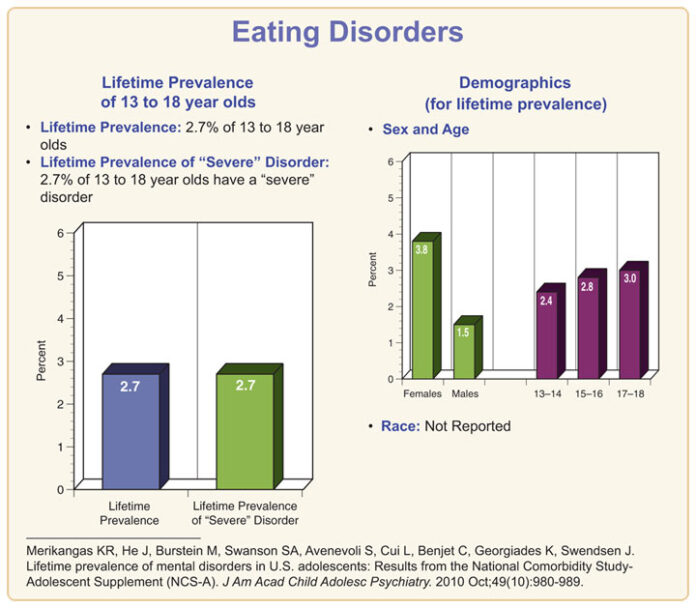A disturbingly large fraction of Americans are just dying to be skinny, and dying is no mere understatement. The psychological health disorders anorexia and bulimia nervosa are exceedingly prevalent among the U.S. population. Roughly 20 million Americans (about 1 in 15 people) suffer from these diseases, and many more likely go undiagnosed. Combine that with the fact that Davis is a college town, and it’s likely someone has a friend or has personally been affected by such life-changing ailments.
Anorexia nervosa is a disorder commonly delineated by an anxious reaction to the presence of food. Oftentimes anorexic individuals, who obsess over maintaining a dangerously low body weight for their height and age, starve themselves and/or participate in excessive exercise routines. Bulimia nervosa is a binge/purge disorder. Someone with bulimia may overeat and force themselves to vomit or compensate for the calories with obsessive exercise. Both of these diseases can detrimentally impact a person’s social, emotional and reproductive well-being; additionally, these disorders are potentially life-threatening.
Anorexia and bulimia, which continue to present innumerable medical, emotional and social complications, are undergoing extensive analysis by medical institutions worldwide, led in part by researchers at the University of California, San Diego.
Individuals suffering from eating disorders such as anorexia and bulimia are oftentimes appealing to a socially constructed image of beauty that is nearly impossible to replicate. That is, unless you are endowed with the exact permutation of genes that code for an unreasonably small waistline, athletic butt, Scarlett Johansson/Ryan Gosling-esque facial features, long, toned, lipid-less limbs (free of all cellulite, of course) and sufficient breast size. Oh, and these stringent expectations apply to both genders.
Researchers at UCSD are taking paradigm-shifting measures in order to better understand and treat patients suffering from anorexia and bulimia nervosa, and anorexia nervosa is the disorder currently under study. With the assistance of brain imaging devices, researchers under the direction of Walter H. Kaye, professor of psychiatry and director of the Eating Disorder Treatment and Research Program at the UCSD School of Medicine, are able to better understand the biological manifestation of psychological reactions that eating-disordered patients have to food. Innovative neurological tests such as these may very well be the extensively sought-after solution to various preventable health maladies.
“Dr. Kaye’s research shows us that eating disorder patients grapple with a high level of anticipatory anxiety. This is similar to the type of anxiety most people feel when approaching something like a test or a presentation. But their anxiety is much higher than what most people would feel, and it does not seem to go down over time as they face the same situation over and over,” said Leslie Karwoski Anderson, UCSD’s clinical assistant professor of psychiatry. “One treatment strategy we have developed and are implementing with our patients involves helping them reduce pre-meal anxiety, which is one type of anticipatory anxiety that makes resuming normal eating especially difficult.”
What many fail to realize is that individuals afflicted with neurologically-based conditions such as anorexia and bulimia nervosa are very deeply integrated into psychology, hence the more-common-than-not fact that anorexics and bulimics cannot be reasoned with.
These disorders effectively overshadow human logic. Oftentimes, those who have the honorable intentions of curing an anorexic or bulimic patient become overly frustrated as their arguments fall on seemingly deaf ears. Members of the medical community have found themselves desperate to find a solution to the common behavioral obstacles and relapses often experienced by anorexic and bulimic patients.
“A major reason contributing to the difficulty in developing new treatments for these disorders is our limited understanding of how brain function may contribute to eating disorder symptoms,” Kaye said.
Kaye also mentioned that in response to brain imaging examinations, many patients feel relieved in knowing that their symptoms are not their fault and actually a physiological reaction to the presence of food.
“We are working with patients and families on learning about neurobiology and how different neurotransmitters and areas of the brain associated with reward, harm avoidance, error detection [and] interoceptive awareness of physical sensations all interact with each other in the brain … We walk them through what physical and emotional experience of what it might feel like for someone with anorexia [and bulimia],” said UC Davis alumni and GFED scholar June Liang. “This has been very helpful for family members of patients to understand what their loved ones are going through, which then helps to guide them in how to help them cope. For the person with anorexia [and bulimia], their struggles feel validated and they feel less alone.”
The UCSD medical community is undisputedly taking trailblazing steps toward solving the psychological mysteries of anorexia and bulimia nervosa. These conditions that silently plague millions, many of which compose the collegiate age group, are just two of many preventable health disorders that Americans are made aware of. Diabetes mellitus type 2, obesity-derived hypertension/chronic heart disease, addictive smoking and even alcoholism, are all avoidable chronic health ailments that neurological testing and psychologically based treatment may help to discontinue and prevent.
The implication that studies, such as those conducted by UCSD, can help to curb the effects and pervasiveness of various health-maladies, is both an alluring and motivational proposition. Perhaps from the psychological and emotional darkness that anorexia and bulimia nervosa pose to their victims, the light of future medical ingenuity and methodology will arise to combat some of the most pressing health trends burdening the American populace.
If you or anyone you know is suffering from anorexia or bulimia nervosa, please call CAPS (Counseling and Psychological Services at North Hall) at (530) 752-0871.
EMILY SEFEROVICH can be reached at science@theaggie.org.





[…] The Aggie Dying to be skinny The Aggie A disturbingly large fraction of Americans are just dying to be skinny, and dying is no mere understatement. […]